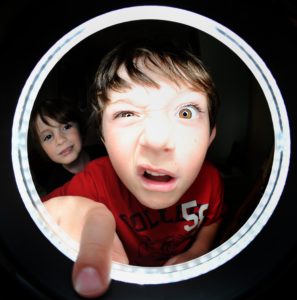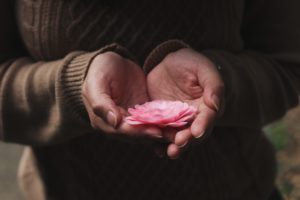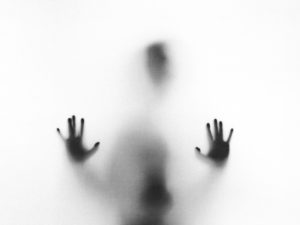by Jenny Rose | Jul 26, 2018 | Connection & Community, Emotional Intelligence, Shadows
I looked up the word “denial” to find a quick definition as a starting point for this post. Fifteen minutes later I was still reading long Wiki articles about denial and denialism. They’re both well worth reading. I realize now the subject of denial is much bigger than I first supposed, and one little blog post cannot do justice to its history and scope.

Photo by Ian Espinosa on Unsplash
I wanted to write about denial because I keep tripping over it. It seems to lurk in the background of every experience and interaction, and it’s nearly always accompanied by its best buddy, fear. I’ve lately made the observation to my partner that denial appears more powerful than love in our culture today.
I’ve written before about arguing with what is, survival and being wrong, all related to denial. I’ve also had bitter personal experience with workaholism and alcoholism, so denial is a familiar concept and I recognize it when I see it.
I see it more every day.
I was interested to be reminded that denial is a useful psychological defense mechanism. Almost everyone has had the experience of a sudden devastating psychological shock such as news of an unexpected death or catastrophic event. Our first reaction is to deny and reject what’s happening. Elisabeth Kubler-Ross identified denial as the first of five stages of psychology in a dying patient. Therein lies the distinction between denial as part of a useful and natural cycle and denial as a permanent coping mechanism. In modern psychology denial is followed by other stages as we struggle to come to terms with a difficult event. We (hopefully) move through the stages, gathering our resources to cope with what’s true and coming to terms with the subsequent changes in our lives.
Denialism, on the other hand, is a “choice to deny reality as a way to avoid a psychologically uncomfortable truth” (Wikipedia). For some, denial is an ideology.
In other words, denialsim is all about fear, fear of being wrong, fear of change, fear of painful feelings, fear of loss of power, fear of one’s cover being blown. This is why some of the most rabid and vicious homophobes are in fact homosexual. Unsurprisingly, projection and gaslighting are frequently used by those who practice denialism.
I’ve no doubt denial is an integral part of the human psyche. I never knew anyone who didn’t have a knee-jerk ability to deny. I do it. My partner does it. My friends and family do it. My partner and I have a code phrase: “I’m not a vampire,” that comes from the TV series Angel in a hilarious moment when a vampire is clearly outed by one of the other characters. He watches her put the evidence together: “… nice place… with no mirrors, and… lots of curtains… Hey! You’re a vampire!” “What?” he says. “No I’m not,” with absolutely no conviction whatsoever. It always makes us giggle. If Angel is too low-brow for you, consider William Shakespeare and “the lady doth protest too much, methinks.” Denial is not a new and unusual behavior.

Photo by NASA on Unsplash
The power of denial is ultimately false, however. Firstly and most obviously, denial does not affect the truth. We don’t have to admit it, but truth is truth, and it doesn’t care whether we accept it or not. Secondly, denial is a black hole of ever-increasing complications. Take, for example, flat-earthers. Think for a moment about how much they have to filter every day, how actively they have to guard against constant threats to their denialsim. Everything becomes a battlefield, any form of science-related news and programming; many types of print media; images, both digital and print, now more widely available than ever; and simple conversation. I can’t imagine trying to live like that, embattled and defensive on every front. It must take enormous energy. I frankly don’t understand why anyone would choose such hideous complications. It seems to me much easier to wrestle with the problem itself than deal with all the consequences of denying there is a problem.
Maybe that’s just me.
It seems our denial becomes more important than love for others or love for ourselves. It becomes more important than our integrity, our health, our friends and family, loyalty, and respect or tolerance. Our need to deny can swallow us whole, just as I’ve seen work and alcohol swallow people whole. Denial refuses collaboration, cooperation, honest communication, problem solving and, most of all, learning. Denialism is always hugely threatened by any attempt to share new information or ask questions.

Photo by Jonathan Simcoe on Unsplash
Denial is a kind of spiritual malnutrition. It makes us small. Our sense of humor and curiosity wither. Fear sucks greedily on our power. We become invested in keeping secrets and hiding things from ourselves as well as others. We allow chaos to form around us so we don’t have to see or hear anything that threatens our denial.
This is not the kind of fear that makes our heart race and our hands sweat. This is the kind of fear that feels like a slamming steel door. It’s cold. It’s certain. We say, “I will not believe that. I will not accept that.”
And we don’t. Not ever. No matter what.
A prominent pattern of folks in denial is that they work hard to pull other people into validating them. Denial works best in a club, the larger the better. The ideology of denialism demands strong social groups and communities that actively seek power to silence others or force them into agreement. Not tolerance, but agreement. This behavior speaks to me of a secret lack of strength and conviction, even impotence. If we are not confused about who we are and what we believe, there’s no need to recruit and coerce others to our particular ideology. If you believe the earth is flat, it’s fine with me. I’m not that interested, frankly. I disagree, but that’s neither here nor there, and I don’t need you to agree with my view. When I find myself recruiting others to my point of view, I know I’m distressed and unsure of my position and I’m not dealing effectively with my feelings.
I’ve written before about the OODA loop, which describes the decision cycle of observe, orient, decide and act. The ability to move quickly and effectively through the OODA loop is a survival skill. Denial is a cheat. It masquerades as a survival strategy, but in fact it disables the loop. It keeps us from adapting. It keeps us dangerously rigid rather than elegantly resilient.
Some people have a childlike belief that if something hasn’t happened, it won’t, as in this river has never flooded, or this town has never burned, or we’ve never seen a category 6 hurricane. Our belief that bad things can’t happen at all, or won’t happen again, pins us in front of the oncoming tsunami or the erupting volcano. It allows us to rebuild our homes in places where flood, fire and lava have already struck. We ignore, minimize or deny what’s happening to the planet and to ourselves. We don’t take action to save ourselves. We don’t observe and orient ourselves to change.
Some things are just too bad to be true. I get it, believe me. I’m often afraid, and I frequently walk through denial, but I’m damned if I’ll build a house there. The older I get, the more determined I am to embrace the truth. I don’t care how much pain it gives me or how much fear I feel. I want to know, to understand, to see things clearly, and then make the best choices I can. It’s the only way to stay in my power. I refuse to cower before life as it is, in all its mystery, pain and terrible beauty.
Ultimately, denial is weak. I am stronger than that.

Photo by Joshua Fuller on Unsplash
All content on this site ©2018
Jennifer Rose
except where otherwise noted
by Jenny Rose | Jun 14, 2018 | Connection & Community, Emotional Intelligence

Photo by James Coleman on Unsplash
Saturday night I attended a monthly open mic event called The Coffeehouse. It took place in the basement of a local church, which is also where our Tai Chi group meets. People came from far and wide to participate. I was there to tell stories for the first time since I came to Maine.
My partner came with me, and I knew two other people there from Tai Chi. Otherwise, everyone was a stranger. I sat quietly in a corner and watched the place gradually fill up. I could see many of these folks were old friends. In fact, during the course of the evening I learned that The Coffeehouse has been happening for more than 20 years in that very basement, hosted by the same man since the beginning. I heard stories, both on mic and off, of cancer, divorces, moves, jobs, remarriage and grandchildren.
Cases were opened and out came guitars of every description. Musicians sat together, teaching one another chords and fingering, and playing together. Ragged sheet music, song lyrics and notes lay on every table. In front of the mic, I heard about being a cafe musician, playing music for weddings, and stories from a couple who composes, writes and performs music together, splitting their time between Arizona and Maine.

Photo by Brandon Wilson on Unsplash
One man stood up and read a short story he’d written. Another gave a hilarious rendition of a Shel Silverstein poem I used to read aloud myself as an elementary school librarian. Yet another read one of his own poems in between playing his guitar. A woman performed on her autoharp.
Many of the performers expressed nervousness, but each was volubly supported by the audience. Jokes were cracked, stories exchanged. Everyone was applauded warmly, including me.
When it was my turn, I stood before them, my heart throbbing uncomfortably in my chest, looking out at a roomful of faces I’d never seen before. I introduced myself briefly and told a short peace tale from China, followed by a longer story from Jane Yolen. The audience was generous, attentive. The poignant memory of other, more familiar audiences in my old place caught at my throat. As I wove the stories, I looked from face to face, speaking directly to each one as though we were alone. Their expressions softened as they entered into the stories with me, seeing what I was seeing and feeling what I was feeling. I know my own face wore exactly that expression as I listened to their music and songs.
Each performer took his or her fifteen minutes or so to share their art. It was a long night. In fact, it started about the same time I like to be heading for bed. Yet that evening fed something in me that’s been starving for three years. I had a strange sense of coming home, of belonging and kinship.

Photo by Andrew Loke on Unsplash
My partner and I talk a lot about community, how essential it is, how to create it, how to join it and how to support it. I believe, as humans, we must find some kind of community to meet our connection needs if we want to live well. We’re social animals, and I think we’re beginning to see the high cost of isolation and disconnection play out in suicide rates, violence and addiction.
The Coffeehouse clarified for me an aspect of community I haven’t really discerned before. Right now, the world is chaotic and increasingly complex. We’re faced with serious issues and changes we’re ill-equipped to deal with. I’ve been thinking about the local food movement, grassroots politics, permaculture, and alternative energy and housing through the lens of community. All of those issues are vitally important, and becoming more so by the day, but I’ve been skipping over the most important thing community can give us, the aspect that must be present, supported and nurtured before any kind of problem solving or effective organization can happen.
The Coffeehouse is, essentially, an adult playgroup. I heard nothing about diet, gun control, immigration, politics or climate change. I heard nothing about social justice or gender politics. We all shared the same bathroom, the same coffee and snacks. We all put a voluntary donation in the basket. Instruments were shared. We shared time, microphones, personal stories and creativity. There was no talk of cultural appropriation.
We laughed together.
We played together.
We were kind and generous with each other.
We took turns.
As I sat there watching it unfold, it occurred to me to wonder how we’re ever going to manage to address all the pressing problems in the world today if we can’t come together as human beings and play with one another first. How do we find our way to collaboration and cooperation unless we build trust and respect and are able to just have fun together? The Coffeehouse showed me humans at their best. Heck, I was at my best. In such a warm and supportive atmosphere, my social anxiety was not disabling. People talked to me, welcomed me, expressed appreciation for the stories and received my appreciation for their contribution in return. I recognized several who performed were more nervous than I was. None of us were hiding behind technological screens. There was no escaping a forgotten lyric, the wrong chord or symptoms of performance anxiety. One of the musicians talked ruefully about a new tremor in his hands that impeded his playing. We could all see it. He played anyway.
In the days since The Coffeehouse, I know I’ve found something I’ve been looking for since I came to Maine. I thought I just wanted a place to share stories again, and I do, but this gathering is about something much bigger than that. This is about mutual authenticity, creativity, contribution and play. It’s about friends. It’s about celebration and connection in the midst of a dark and stormy time.
I can hardly wait for the next one.

Photo by rawpixel.com on Unsplash
All content on this site ©2018
Jennifer Rose
except where otherwise noted
by Jenny Rose | Jun 7, 2018 | Aging, Connection & Community, Emotional Intelligence
Have you ever had a dream of finding an undiscovered room in a familiar house? I have, several times. I like those dreams. A large piece of furniture moves aside, or I walk into a room I know well and find a new door in it.
Last weekend, my partner and I went to our small local theater and I saw Book Club while he went happily off to Deadpool. (Honestly, I’m so tired of comics, superheroes, space adventures, special effects and unending battles and chases. Whew. It felt good to say that.)
The movie was a relief. I didn’t have to spend most of it with my eyes shut trying to filter out the entirely overstimulating and, at the same time, boring hyperactivity, and it wasn’t excellent. It didn’t require anything from me except to sit back and relax.
No spoilers and this is not a movie review, but Jane Fonda tries way too hard. Instead of marveling at her artificial youthfulness, I felt rather sorry for her. There was also a lot of unnecessary drinking. It didn’t add anything to the story. Some of the humor was more of a wince than a chuckle, but there were some truly funny moments. The writing was a little inconsistent. It’s a movie about connection and being an aging woman.
Overall, I could relate to these four women and I found the movie oddly touching in an unexpected way. I’ve been thinking about it ever since, in fact, trying to understand why it made me feel so bittersweet.
It has to do with giving up. Well, not really. Not giving up, exactly, but settling. No, that’s not quite right, either.
It has to do with gradually forgetting to entertain possibility.
That’s better.

Photo by Joshua Rawson-Harris on Unsplash
We inhabit our lives like a house. It’s a finite space, and we’re intimately familiar with the floorplan, the closets, the windows and the doors. Our house is defined by ourselves and the way we live, and it’s also defined by the external world and people around us. Outside our house is a world where all kinds of potential physical and emotional harm crouches, waiting for us to take a risk and leave our shelter. Outside our house is a wilderness of Unknown.
When we’re young the house of our life is new and exciting. We experiment using the space in different ways. We begin to figure out what we like and don’t like, what works well in our lives and what doesn’t, who we can live with and who we can’t live with. We gradually accumulate furniture in the forms of memories, scar tissue, hand-me-downs, beliefs, and new stuff we find all by ourselves.
The years go by and we learn a lot (hopefully) about the way the world works and who we are. We notice an ever-enlarging population of people younger than we are.
Then, one day, we’re in our fifties. Then our sixties. Then our parents are old. Not older. Old. How did that happen? Then our kids are as old as we were when we had them. It’s entirely disconcerting. We begin to think of ourselves as middle-aged and secretly feel older than that a lot of the time. Then, if you’re a woman, comes menopause, which, just as the onset of menstruation changed everything in the beginning of our lives, remodels our house.
For one thing, we need to tear out the heating system and replace it with cooling and fans.

Photo by Ian Espinosa on Unsplash
By this point in my own life, I’ve made a lot of choices and taken notes on how they worked out. I’ve made decisions about what I will and won’t do, and about what I am and am not interested in. I’ve decided what dreams to discard and interests to drop, because I’m out of time, energy or both. I’ve decided I know exactly who I am, what I’m capable of and what I need and want. I have an entirely private (because it’s shameful) list of things I’ve given up on.
Book Club speaks to the ways in which we begin to limit possibility as we age. In my case, it has nothing to do with age, though. I’ve been slamming doors behind me my whole life. When I was 18, I turned my back on high school. When I was 20, I left residential college, never to return. When I was 21 and got married, I gave up on dating or looking for love. When I was 27 and had my first child, I stopped dreaming of freedom and adventure.
And so on.
Of course deciding we’re never going to do something ever again practically guarantees the Gods will throw it back to us sooner or later, giggling. Now when I hear myself say, “Never again…” I can smile.
An even darker aspect of refusing possibility has to do with the dreams and desires we’ve never fulfilled. I’ve always struggled with financial scarcity. I tell myself nearly every day I’ll never be financially successful, and it doesn’t matter, because I have a good life, I have what I need, I’d rather have my self-respect and integrity than be rich (note the belief one can’t have both), and it’s not a big deal. I say all those things to myself because I don’t see any possibility of financial security. If I haven’t found it following all the rules and working so hard, then maybe I don’t deserve it, or it’s just not something I can earn or have. I don’t want to live the rest of my life hoping for something that never happens.
The story I tell myself is I’d love to find a great job where I could contribute my talents, do meaningful work, be part of a team and get adequately paid. I’m always watching and listening for that job. But I know I’m too old, the things I love to do will never pay well, the kind of thing I’m looking for wouldn’t be here in rural Maine, and I’ll struggle to maintain adequate housing and feed myself forever.
If there’s no possibility, I can work on accepting what is and try to be peaceful.

Photo by Nathan Dumlao on Unsplash
Book Club was redemptive. It reminded me possibility still exists for me. I’ve done things in the last five years I never imagined doing in my wildest dreams. Why do I think it’s all over now? Why do I make so many iron-clad assumptions about the size and shape of my house? Why am I deliberately trying to ditch my dreams? Why do I think of myself as a food item on the pantry shelf with an expired sell-by date?
Am I too old and jaded to invite miracles? Am I too worn out to move a piece of furniture (a bookcase, what else?) and discover a door behind it I never saw before? I know I’ve yet to discover my highest potential.
Maybe I’m just not very brave. I don’t want to fail anymore. I don’t want to be disappointed or feel I’m a disappointment, ever again. I don’t want to be let down, or hurt, or stood up or rejected. I don’t want to look like a fool. (I don’t mind being a fool, but I don’t want to look like one.) I don’t want to be scared.
I don’t want to play power games with people.
Perhaps this is the crust of old age, this gradual accumulation of weariness, scar tissue, limiting beliefs, and physical changes that keeps us sitting in our familiar, safe house, where the edges and boundaries are well-defined and unchanging and we control the dangers of possibility.
Some people successfully shut out life, or shut themselves away from it. I’m never (there I go again) going to be able to pull that off, though. I’m too curious and too interested. An overheard remark, a movie, a conversation, a book or even a song lyric invariably comes along and kicks me back into motion when I’m threatening to lock myself permanently in the predictability and safety of my house. Then I begin to write, and the walls waver and shimmer, new doors and windows appear, a corner of the roof peels away to show me the sky, and I remember I’m still alive, still kicking, still wanting and needing and still, in spite of my best efforts, dreaming of possibilities.

Photo by frank mckenna on Unsplash
All content on this site ©2018
Jennifer Rose
except where otherwise noted
by Jenny Rose | May 31, 2018 | Connection & Community, Emotional Intelligence
A couple of years ago my adult son and I had a heated exchange during which I asked him exactly what he wanted from me. It was a useful question. For a moment we stopped being adversaries while he thought about it. “Umm, I don’t know. What I’ve always had, unconditional love, I guess.”

Photo by Jordan Whitt on Unsplash
That moment has stayed with me, because as I asked the question I realized I really didn’t know, and I was both curious and interested. What does a fully emancipated twenty-something-year-old man honestly want from his mother? It was the first time it ever occurred to me to ask either of my sons what they wanted from me at any age or stage.
I never thought of anything except what I wanted to give them.
I’ve been reading about emotional labor recently, which leads me irresistibly to the concept of benign neglect.
Emotional labor is the often invisible process of managing feelings and their expressions as part of a job or relationship. The idea often comes up as part of the ongoing discussion about gender roles and equality, but I’m thinking about it in a slightly different context.
Benign neglect is a term that originated out of city planning politics and now also describes an attitude of inaction regarding an unproductive situation one is commonly held to be responsible for.
I’ve written before about pleasing people, boundaries and reciprocity. Emotional labor is embedded in all of these, and it’s been a primary dysfunction in my relationships over the years, though I haven’t had any language or distinction about my experience of it until recently.
If you Google emotional labor you find definitions, descriptions, assertions about the disproportionate burden of emotional labor on women, and the powerful but invisible expectations regarding who is responsible for emotional labor in any given situation. What you don’t find is discussion about how to make visible and support the vital aspect of emotional labor in community, jobs and families. The discussion stops at equal rights.
Equal rights is an important discussion to have, but in the meantime we’re dealing with families, friends and jobs today and emotional labor is an inescapable need right now.
I think of emotional labor as glue. You don’t see it, but if it’s missing everything falls apart. If it’s applied carefully it holds things together. If we don’t keep a calendar and glance at a clock now and then, we can’t manage our lives. Either we learn to cope with appointments, deadlines, commitments, grocery lists and feelings ourselves or we rely on someone else to do it for us. Part of adulting is learning emotional labor.

Photo by freddie marriage on Unsplash
I’m a button sorter by nature, and I take a lot of pleasure in being organized. My life works better when I take the trouble to be effective and efficient, and it gives me pleasure to share with my loved ones the benefits of thinking and planning ahead and taking care of business. Remembering special dates, buying tickets, planning for bake sales and decorating for the holidays have all been offerings symbolizing my love and willingness to provide support to my family, along with the daily activity of simply showing up in my relationships.
I said that recently to my partner — “this is me showing up in the relationship.” He had no idea what I meant.
I was staggered. What do you mean, what do I mean? You know, asking if you slept well because you didn’t the night before. Or inquiring about the status of that headache you complained about yesterday. Or asking you what’s in your attention and what you’d like to do today. Listening. Sharing. Showing concern. Demonstrating I appreciate you enough to be present. Reminding you that we’re almost out of cat litter. Thanking you for patching the mousehole in the cupboard. Showing up in the relationship!

Photo by Ester Marie Doysabas on Unsplash
Yeah. Aka emotional labor.
He listened and shrugged. I didn’t describe anything he could relate to. He lives his life with me without showing up or not showing up. He just does what he does, says what he says, is interested in what he’s interested in. He doesn’t check in with himself every day to be sure he “showed up” in a way that reassures me of his ongoing affection and caring.
I do.
I’ve thought a lot about this since that conversation. I’ve been conscious of a huge annoyance and, underneath that, amusement.
All my emotional labor is completely unneeded. He never asked me to do it. It’s not useful. It’s invisible to him.
This made me wonder if that’s been true in all my other relationships as well, including with my kids, historically and presently.
That’s not right, though, because I’ve been with some real man-babies. My husband once called me at work because the baby had a soiled diaper. (Okay, it was a real blow-out, but still!) Then there was the guy who wanted a dog to fish with, but didn’t want to walk it, poop scoop after it or stay up all night on July Fourth holding its paw because it was terrified of firecrackers and invariably went into seizures (it had epilepsy).
And then there were the kids. There’s no question at all that raising kids takes a lot of emotional labor. It’s both needed and required.

Photo by Chris Barbalis on Unsplash
I guess I just got into the habit. Emotional labor has been my offering, my contribution, in every relationship. I’m good at it. Until very lately, I never considered reciprocity and I had no definition for emotional labor. I just thought of it as being a good woman.
When my son said he wanted what I’d always given, unconditional love, I had a moment of real satisfaction. I made so many mistakes, but at least I did that right. On the other hand, can those two simple words ever encompass the totality of heart, pain, frustration, energy, loyalty and years they represent? Unconditional love. That’s all.
Right.
I was with a man for a long time who had no interest in emotional labor. Once he had me hooked, he was never decisive, confident or clear again. He initiated no physical contact. He resisted making any plans. He made no effort to develop rituals, routines or regular check-ins. His job was stressful, he had some sleep and health issues, and his favorite excuse was “I forgot.” I gave and he withheld.
Eight years later (slow learner) burned-out, anguished and desperate, it occurred to me to wonder what would happen if I. Just. Stopped.
So I did. I stopped e-mailing. I stopped calling. I made plans without him. I let go of all my expectations and started trying to glue myself back together. I worked, took care of my own responsibilities, enjoyed time with friends and family and went on with my life. I set down all that emotional labor and walked away from it.
Guess what happened?
He floated away.
I’d essentially had an eight-year relationship with myself.
He did eventually (weeks) notice I wasn’t around any more and got in touch, mildly puzzled and reproachful. I was casual and said I’d been busy.
He told me he didn’t feel like he was getting the attention he needed from me. We were sitting in his car at the time. I’ll never forget it.
Until now, I’ve never put that experience in context with all my other relationships. After my recent conversation with my partner about showing up in the relationship, I changed my behavior. I stopped worrying about “showing up” every day. I’ve engaged with my own needs, daily tasks and schedule. I enjoy our time together, but I’ve stopped trying to make it happen. I switched my focus to making sure I show up for myself every day.
What I’ve learned from all this is emotional labor is real and largely unconscious. Many of us give our lives to it. I’ve also learned it’s a choice. When it remains invisible and undefined and we’re operating out of unspoken cultural expectations, we become unconscious of much of our decision-making and motivation. Our desire to be a “good” wife, mother, daughter, lover, sister, whatever, becomes all-powerful and we throw ourselves into it without ever thinking about whether that’s what others want and/or need from us. We don’t consider asking for help or professional support if we’re caregivers. In fact, we feel hurt when our emotional labor of worrying, for example, is not received with gratitude and appreciation! If whoever we’re connected with does want our emotional labor and provides none themselves, we don’t notice. We just work harder.
This is where benign neglect comes in. Benign neglect is an attitude of inaction regarding an unproductive situation one is commonly held to be responsible for, remember? The culture may hold us to be responsible for a lot of things, but that doesn’t make it true.
What if we challenged the “commonly held” belief that all emotional labor is our job in any given relationship? What if we decided it’s not our responsibility, in addition to not being useful, to worry, fuss, organize or manage the feelings of the people around us? What if we took back our power to choose?

Photo by Bruno Nascimento on Unsplash
If I had stopped worrying about doing laundry for my teenagers, or insisting on family mealtimes, or keeping track of their schedules, what then? The sad truth is I was afraid people would think I was a bad mother. I knew I would think I was a bad mother. The kids didn’t do those things for themselves, so I had to do it in order to demonstrate my love, commitment and competence. What kind of a mother lets her kids wear dirty socks?
I didn’t consider the difference between organizing schedules for toddlers and organizing two big, smart, capable boys who saw no reason to bother themselves with boring things like schedules, grocery lists and clean socks. I was so busy demonstrating my feelings, especially my love for them, I never stopped to wonder if they were learning to express their feelings. I didn’t ask.
It annoys me that only now am I seeing ways in which I could have been a much more effective parent, partner, daughter and sister.
At bottom, I don’t think emotional labor is about equal gender rights at all. I think it’s about choice, and choice is about power. We can’t choose if we don’t recognize there is a choice, we can only stumble forward blindly, doing our best with what we think the rules and expectations are, external and internal, until, overburdened, overwhelmed and exhausted, we fall down and don’t get up again. Meanwhile, the people we love, the ones we’re doing all this labor for, are not saved by our labor. Kids grow up, have car accidents and bad relationships, choose crappy diets, fall into addiction, catch an STD. Parents grow old, have health problems, and become dependent. Siblings, friends, lovers and mates are not assisted by our worry, our ability to manage their feelings or our “showing up” in the relationship. All our loved ones might be a great deal better off if we hadn’t taken on all the emotional labor ourselves, because when life happens, as it inevitably does, they lack the skills we never let them learn because we were so busy being good women.
Also, when was the last time you were thanked for all your emotional labor? (What do you mean, “showing up” in the relationship?)
You gotta love the irony of the whole thing.
What would my relationships look like if I kept my emotional labor in balance with the labor of those I’m connected to? What if I could be more like my partner and trust that my affection and love for him (and others) are communicated and understood without such deliberate emotional labor? He just naturally demonstrates his feelings for me in our day-to-day life without all this effort and trying. What if I relaxed and redefined what being a “good woman” means?
I’m going to find out.

Photo by Ryan Moreno on Unsplash
All content on this site ©2018
Jennifer Rose
except where otherwise noted
by Jenny Rose | May 10, 2018 | Connection & Community, Emotional Intelligence, Shadows
Slowly, I’m finding online communities of writers. As I’ve shaped Our Daily Crime, I’ve connected with other bloggers. These connections mean I spend at least an hour a day reading the work of others. I’m inspired, touched, tickled and provoked, and I feel at home in these digital communities because we all share the need to write and be read. We also share self-doubt, confusion, vulnerability, loneliness, the need for connection and the problem of earning a living.

Photo by Volkan Olmez on Unsplash
Over and over again, I read about personal struggles with depression, fear and anxiety. Many a writer sits down to their daily writing practice with goals and intentions and finds him or herself unable to do anything but express the here and now of their experience of ambivalence, avoidance, distraction or block. To be a writer is to occasionally live with shame and guilt about what we meant to write, what we should have written and the quality and subject of what we actually did come up with. We all doubt our ability, our value, and whether anyone will care enough to read our words. Creative expression is a daily leap of faith.
I’ve struggled all my life with depression. In more recent years, I’ve come to understand anxiety and fear are also large parts of the feeling I recognize as depression. Over the years I’ve tried to manage depression in many ways. Some worked, at least temporarily, and some didn’t.
It hasn’t been until the last decade that I’ve finally found a way to effectively manage and even largely banish depression. It doesn’t play with me anymore. Fear and anxiety still show up regularly, but the same method works to manage them, and I no longer worry one day I’ll just give up, step over some unseen edge, and disappear into crazy, a fugue state, or death.
One day, for no reason in particular except I felt exhausted, despairing, and bored with both, I said to Depression, “You win. I give up. Why not come out of the shadows and show yourself?”
Fat and happy, secure in its power, it did just that.
The first thing that I realized was Depression is an experience, not an integral piece of me. It’s something draped around me. It can be separated from me.
The second thing I noticed was my depression is male. He walked with an arrogant male strut and swagger and he spoke in a male voice.
I didn’t name him because he wasn’t a pet, he wasn’t a friend, and he most definitely wasn’t invited to be a roommate. He was merely someone who showed up at more or less regular intervals and made a nuisance of himself. He didn’t have the manners to knock on the door, wait to be invited or give any notice of his arrival. He just appeared.
I wondered what it would take to discourage him from visiting. What made me so attractive?

Photo by Stefano Pollio on Unsplash
Clinical depression is like a grey cave filled with fog. It numbs the senses and fills head and heart with cold, sticky, lumpy oatmeal. One is entirely alone with no hope. The simplest action, like opening one’s eyes, takes enormous effort. Depression envelopes and consumes every spark of power.
The only reason I’m in the world today is because I’m an unbelievably stubborn butthead. I’m also very nice. One does not cancel out the other, but nearly everyone persists in missing that second important point, with the result that I’m constantly being underestimated. This is a wonderful advantage in life.
Depression was no exception to the rule. When invited, he disentangled himself from me, parked his butt in a chair I pulled out for him, and began to tell me how things were going to be from now on.
On that particular day, I hadn’t showered (or the day before that, or the day before that). Annoyed by his high-handedness, I interrupted to say I was going to shower. He told me not to. Who would care? What was the point? I wouldn’t see anyone. No one would see me.
That was all I needed. I went and took a long shower. Washed my hair. Shaved my legs. Put on clean clothes and some jewelry. Depression sat in the bathroom and muttered at me. I ignored him.
I felt better then, and my irrepressible creativity began to stir, along with a childlike streak of playfulness I usually keep well-hidden. One small act of rebellion had helped me regain a tiny sense of power.
One of the things that used to happen when depression struck was that I stopped eating. I’d go all day with nothing but a salad and a piece of toast. I hadn’t eaten a solid meal for several days on this occasion. I wasn’t the slightest bit hungry (this is common), but I knew I needed to eat.
Depression didn’t like it. He threatened and complained and trotted out all the usual points. I was too fat. I hadn’t been doing anything useful and didn’t need to eat. I didn’t make enough money to deserve to eat.

Photo by Florencia Potter on Unsplash
I put a chair at the table for Depression (I lived alone at the time), invited him to sit, set the table for two with complete place settings, right down to two glasses of water, made myself a meal, and ate. I offered him some food, but he refused. I read while I ate and ignored Depression, who sat and sulked.
Well, you have the idea. The more he protested when I wanted to take a walk, sit in the sun or work in the garden, the more stubborn I became. I politely invited him to join me in my activities, but he refused, which meant the more I got out in the world and did things the less time I spent with him. He hated my movies and my audio books. He thought walking to Main Street for an ice cream cone was a criminal waste of money, along with feeding the birds. The only activity he approved of was my work, which involved sitting for hours in front of my computer with headphones on doing medical transcription as fast and accurately as possible for only slightly more than minimum wage.
He absolutely hated my music. I quickly developed the habit of turning on Pandora first thing every morning and listening to it most of the day.
We also conflicted over sleep. Depression said there was no point in getting up in the morning because no one would notice. No one would care. In fact, the only things really worth doing in life were working and sleeping. This attitude ensured I set the alarm for 5:30 a.m. and walked every day at dawn.
I didn’t ask him to leave. I didn’t fight or struggle. I made sure he had plenty of space and a good pillow in my bed. I gave him a spot at the table and a seat in front of the TV. I took out a clean towel for him and invited him to browse in my personal library.
Every single time he told me not to do something I did it, no matter how much I didn’t want to. I was pleasant, noncompliant, resistant and stubborn as a mule.
You know what?
He went away.
One day, he was just gone.
I knew I’d found the key.
Externalized, Depression suddenly became more pathetic than terrifying. He was so predictable, and so limited. All he had to say were the same things he’d been saying all my life. He was boring. He was like a batty old uncle who must be invited to every family gathering and tells the same interminable stories year in and year out.
He came back, of course, but for shorter and shorter visits at wider and wider intervals.
“Back again, I see,” I’d say. I’d set a place at the table, take out a clean towel, make space in the bed and on the couch. I’d realize I was sliding again and concentrate on eating more regularly, exercising, playing music, putting flowers on the table or maybe scheduling a massage.
I tried to have conversations with him, but Depression had no conversation, just the same tired monologue, mumbling and whining. He was really quite sad. He stopped spending the night and then gradually stopped visiting altogether.
I guess he was no longer getting what he needed from me.
Fear and anxiety are still regular visitors. Things are different here in Maine. I don’t live alone, for one thing. I still play imaginary games, but only in my head. Still, when either fear or anxiety show up, I recognize them. (Anxiety bites her fingernails; I always recognize her hands.) I don’t try to keep them away and I don’t try to hide from them.
I focus on giving them no power. I don’t buy into their catastrophizing. I appreciate they’re trying to keep me safe, poor things. All they can do is make up terrible stories about what might happen and then sit, paralyzed by their imaginings. I know they’re wretched. I wish I could help. I try to be kind — at a distance. They usually don’t stay long.
This experience is the sort of thing I used to hide, but I realize now my struggles are not unique. I’m inspired by the creativity, honesty and vulnerability of other writers. Coping with depression, anxiety and fear is like figuring out how to eat. Every body is different. Everybody needs to find their own path to healing, health and sanity. At times, it’s difficult to break through social expectations and shoulds and make a complete left turn into something creative, intuitive or outside the current norms.
Still, nothing succeeds like success. Turning Depression into an externalized character helped me see I didn’t have to define myself by it. I could choose to set aside that label and all it implies. Once I truly believed I had the power to choose, everything changed.
Sometimes, running away from sudden or passing danger is appropriate. However, running from these chronic spectres dogging my heels has not worked. I can’t get away from them. I can’t avoid or evade. Being chased by anything is fearful. The moment when I stop running, turn around and deliberately go toward whatever threatens me is the moment in which I begin to regain power. Monsters suddenly become mice. My own fear and abdication of power are what made them monstrous. I don’t need to hide. I don’t need to defend. I only need to consistently and patiently demonstrate I will give them nothing they want so they choose to leave me.
It helps when they tell me what to do.
Don’t tell me what to do!

Photo by Senjuti Kundu on Unsplash
All content on this site ©2018
Jennifer Rose
except where otherwise noted
by Jenny Rose | Apr 19, 2018 | Aging, Connection & Community, Emotional Intelligence
It’s strange to be aging, isn’t it? It doesn’t matter if you’re in your 20s or 60s, getting older is a remarkable experience. As I move through my 50s, I see more and more of my life when I look over my shoulder and I no longer have the feeling of limitless horizons in front of me. Whatever is ahead, it’s not limitless.
I have a friend who looks at a tape measure and finds the number of inches corresponding to his age. He takes in the distance between the end of the tape and his place at 70 something. Then he puts his finger at another 10 years, another 15 years. The visual on this exercise is startling. What happened to all those years of our life, and when did we move so close to our last day?

Photo by Cristian Newman on Unsplash
For at least a decade now I’ve been watching my elders and trying to figure out how to age gracefully. Every now and then I meet a remarkable elder. They have a twinkle in their eye, they laugh a lot, they’re curious and interested and they’re wonderfully authentic. I want to grow up to be just like that.
I’m convinced the great keys to aging gracefully are staying in intimate connection with ourselves every single day, no matter how old we are, and embracing change like a lover. Without consent and resilience, aging becomes a bitter battle to the end.
So many of us, as we age, live increasingly in the past. It’s understandable. We’ve been, done and seen a lot. The problem is as the years roll over us we don’t update our software. We hang on to what we were, what our bodies could do, how it all was during a time we remember as the best time (or at least a better time than now). We continue to define ourselves by outdated habits and routines. I’m not sure if this is a function of nostalgia or weariness or just plain laziness, but somewhere along the way we cross some invisible finish line, stop paying attention to embracing how things are right now and start waiting to die.
As our software gets more and more out of date, incompatibilities arise between how we show up in the world and our stories and memories. We lose credibility and effectiveness.
It seems to me the day we stop being curious about what we might learn, do or be next is the day our lives really end. People who age gracefully still have plans. They still dream. Their thinking remains flexible, even if their bodies don’t. They find some magical balance between letting go and moving forward. Change becomes a beloved friend rather than a feared enemy.
It’s not hard to see this in small external ways. We hang on to clothing, for example, that no longer fits, or was fashionable for a fleeting moment fifteen years ago. We hang on to books or movies or music we once loved and couldn’t do without, but now have outgrown. I don’t suggest there’s anything wrong with such nostalgia, but I do think all that stuff can pile up around us and block a clear view of what is now, or what might be ahead. Too often, the externals mirror our internal habits.
I notice many people my age still describe themselves by a job or position they no longer have. Some folks seem almost apologetic about being retired, as though they’ve lost personhood in the world, have become nobody. Others tell you all about some beloved skill or activity, how they practiced it, the ways it enhanced their life, their mastery, but never mention it was all long ago and right now, today, that activity is no longer part of their lives. Their lives have changed, but they haven’t updated their sense of identity. They’re stuck in their past and missing their present. They dangle in the empty gap between who they were and the stranger they are now.
I think some people feel angry about aging. We want our bodies to look, feel and perform the way they used to. We refuse to adjust to our present physical realities because they don’t match what we used to be able to do. We’re ashamed of our changing bodies rather than comfortable in them. We fear the changes the years bring and try to hide them or resist them.

Photo by Capturing the human heart. on Unsplash
Then there are people, amazing people, who know the trick of beginning over and over again throughout their lives. They spend their professional years as a lawyer and then retire and become an artist. A woman marries, works, raises a family and then, divorced and in her 60s, begins traveling all over the world. People in their 50s and 60s go back to school and acquire a new skill or a degree. They live in the day they’re in, in right now, and they’re focused on the present and future rather than the past. They accommodate their physical needs, feel at home in their skin and are constantly updating their identity, intentions, connections and contributions.
Defining ourselves by our pasts is a sad business. I know aging can feel limiting, but I think the real limiting factor in aging is refusing to participate in it! Defining ourselves by what we can’t do, don’t do or once did (but no longer) is a terrible way to live at any age, but in old age it becomes a pernicious habit indeed. After all, anyone may have physical limitations at any age. Those limitations needn’t define us unless we invite them to.
Considering what is possible, what we can do, what we’d like to do and what we’ve always wanted to do — now, there’s a set of questions for living a full, rich life, today and tomorrow. An elder who draws wisdom from years of experience and has a well-exercised sense of humor, curiosity and the ability to learn is indomitable, irrepressible and irresistible.
Life brings many things, including devastating loss, injury and illness. Every day we live we’re aging, and every day is a new gift we might choose to receive, or we might turn away and look only at the old gifts, the old days, all that came before when we were younger, better looking, stronger, more hopeful, more innocent.
I know what’s behind me. Some of it was grand and some very painful indeed, but it’s all over, good and bad. Many of the clothes I wore, the thoughts and beliefs I held firmly onto, the meaningful routines and rituals in my life, are like so many dropped leaves, fluttering in the wind of my passing. I have no idea how much time I have left or what’s in front of me, but there’s so much I still want to do! Still, I cling to the past in some ways. I tell myself such-and-such (a lovely, longed-for thing) will never happen again. I say I can’t do XYZ instead of I’ve never done it before and will you teach me how? I feel frustrated and old when I wrestle with a 40-lb bag of bird seed and my back hurts for three days. I can be just as lazy, sulky, resistant and weary as anyone else.
Yet I’m convinced enormous grace lies in aging, if we can find it. I believe aging is full of invisible gifts, insight and strength. I want that grace. I don’t want to miss the last part of my life because I’m refusing to be present with it. I want to take the time to close all my programs and apps and let my psyche and body update and reboot regularly.
Aging with grace is a work in progress. Some days are more graceful than others.

Photo by ivan Torres on Unsplash
All content on this site ©2018
Jennifer Rose
except where otherwise noted























